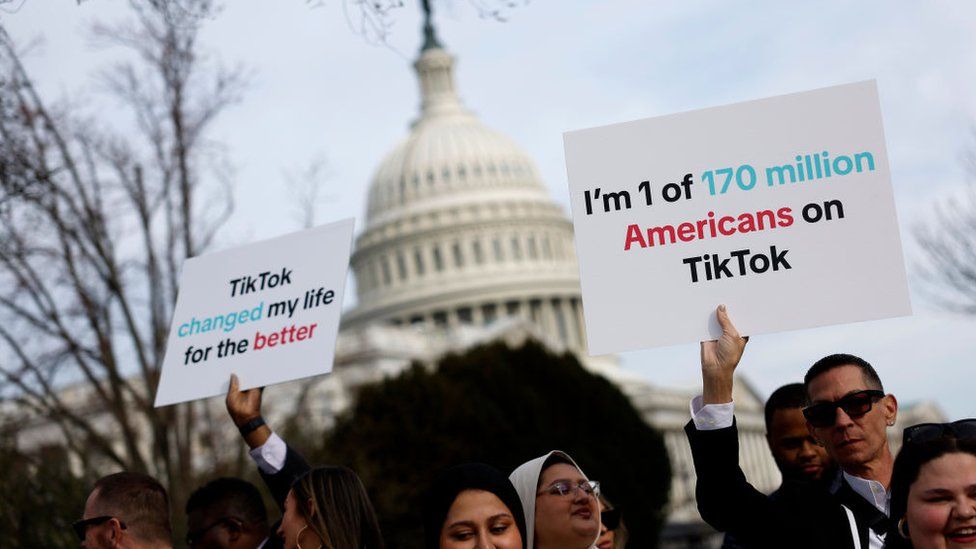
By Liv McMahon
Technology reporter
US politicians are debating new legislation which would ban TikTok in the US unless its Chinese owners sell the company.
The video sharing app has millions of users around the world, but is facing questions over the security of users’ data, and its links to the government in Beijing.
Who wants to ban TikTok in the US and why?
Politicians from both major US parties have introduced a new bill which would ban TikTok unless owner ByteDance agrees to sell the app to a non-Chinese company.
The lawmakers fear that the Chinese government could use security laws to force ByteDance to hand over data about TikTok’s 170 million US users.
TikTok insists it would not provide foreign user data to the Chinese government.
The US House of Representatives passed the bill on 13 March, with 352 voting in favour of the proposed law and 65 against.
Image source, Getty Images
Democrat Raja Krishnamoorthi (l) and Republican Mike Gallager talk to reporters after the House of Representatives passed their bill
It now moves to the Senate, where it is likely to face rigorous scrutiny. It is not clear whether a majority of senators will approve the bill.
US president Joe Biden says he will sign the bill into law if it is approved by the Senate.
This is the latest attempt by the American authorities to curb TikTok.
Former US President Donald Trump tried to ban the app when he was in the White House in 2020.
But Mr Trump – now confirmed as the Republican candidate for the 2024 presidential election – has criticised the new legislation, arguing that limiting TikTok would unfairly benefit Facebook.
When would a TikTok ban happen if the bill becomes law?
The bill still has some way to go before it becomes law.
But if it passes the Senate and is signed into law by President Biden, ByteDance would have six months to sell TikTok before any ban would take effect.
How would a TikTok ban work?
The most straightforward way for the US to ban TikTok would be to remove it from app stores, such as those operated by Apple and Google for iOS and Android devices.
Image source, Getty Images
App stores are how most people download apps on to their smartphones and tablets, so the ban would stop new users from getting TikTok.
The bill also forbids “foreign adversary controlled applications” from being updated and maintained in the US.
That means people who already had the app would no longer be able to get future updates designed to improve security or fix bugs.
What has TikTok said it will do about the legislation?
TikTok has been highly critical of the legislation, accusing the US of “unjustly” behaving like a “bandit”.
Chief executive Shou Zi Chew warned the bill would give “more power to a handful of other social media companies”, and put thousands of American jobs at risk.
Image source, Getty Images
TikTok chief executive Shou Zi Chew studied at Harvard Business School and spent time at Facebook
ByteDance would have to seek approval from Chinese officials to sell TikTok, but Beijing has vowed to oppose such a move.
How have TikTok users in the US responded?
Some US creators and users have also criticised the proposed ban.
Tiffany Yu, a young disability advocate from Los Angeles, told the BBC at a protest outside the White House the platform was vital to her work.
Watch: How do young Americans feel about a ban on TikTok?
TikTok asked its 170 million US users to contact their political representatives and ask them not to support the bill.
But the deluge of “confused” calls from TikTok users to congressmen and senators appears to have backfired.
Several politicians say the campaign has worsened the concerns they have about the app, and strengthened their resolve to pass the legislation.
Is TikTok be banned in other countries?
If the bill becomes US law, it could inspire similar moves elsewhere.
TikTok is already banned in India, which was one of the app’s largest markets before it was outlawed in June 2020.
It is also blocked in Iran, Nepal, Afghanistan and Somalia.
The UK government and Parliament banned TikTok from staff work devices in 2023, as has the European Commission.
The BBC also advised staff to delete TikTok from corporate phones because of security fears.
How does TikTok work and how much user data does it collect?
At the heart of TikTok is its algorithm.
This is a set of instructions within the app which determines which content is presented to users, based on data about how they engaged with previous material.
Users are offered three main feeds on their app – Following, Friends and For You.
The Following and Friends feeds present users with content from people they have chosen to follow and who follow them back, but the For You feed is automatically generated by the app.
This curated feed has become the main destination for users looking for new content, and creators hungry for the millions of views TikTok videos can clock up if they go viral.
Critics say the app collects more data than other social media platforms in order to power its highly personalised system.
This can include information about users’ location, device, the content they engage with and keystroke rhythms they exhibit while typing.
But popular social media apps such as Facebook and Instagram collect similar data from users.








